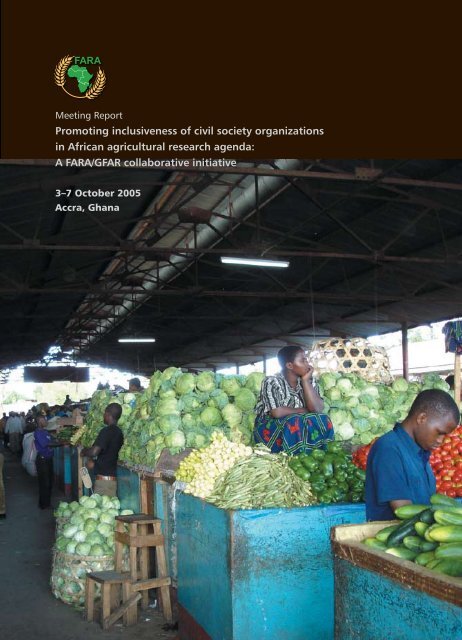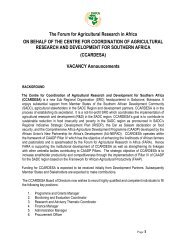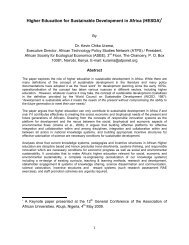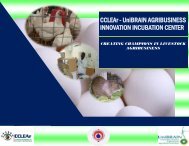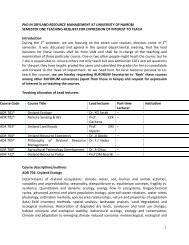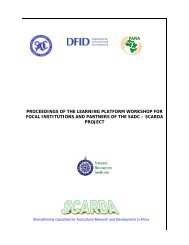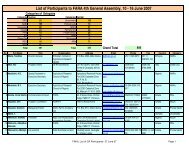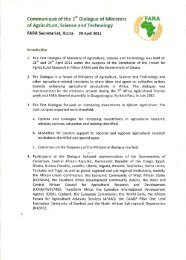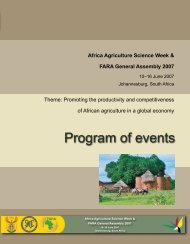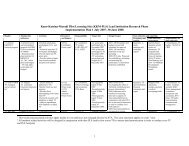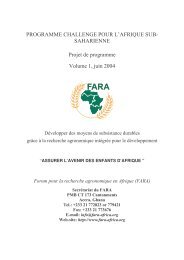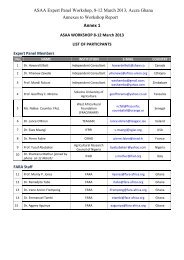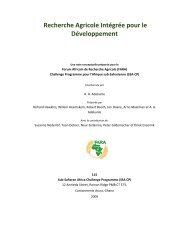Promoting inclusiveness of civil society organizations in ... - FARA
Promoting inclusiveness of civil society organizations in ... - FARA
Promoting inclusiveness of civil society organizations in ... - FARA
Create successful ePaper yourself
Turn your PDF publications into a flip-book with our unique Google optimized e-Paper software.
Meet<strong>in</strong>g Report<br />
<strong>Promot<strong>in</strong>g</strong> <strong><strong>in</strong>clusiveness</strong> <strong>of</strong> <strong>civil</strong> <strong>society</strong> <strong>organizations</strong><br />
<strong>in</strong> African agricultural research agenda:<br />
A <strong>FARA</strong>/GFAR collaborative <strong>in</strong>itiative<br />
3–7 October 2005<br />
Accra, Ghana
Contents<br />
Summary 1<br />
Introduction 2<br />
Process and approach 3<br />
Participation 4<br />
Sub-Saharan Africa NGO Consortium (SSA NGOC) 4<br />
Farmers’ groups 5<br />
Private sector 6<br />
Centre for Innovation <strong>in</strong> Development (NovAfrica) 6<br />
CORAF/WECARD 7<br />
Forum for Agricultural Research <strong>in</strong> Africa—<strong>FARA</strong> 7<br />
Sub-Saharan Africa Challenge Programme (SSA CP) 7<br />
Build<strong>in</strong>g African Scientific and Institutional Capacity (BASIC) 7<br />
Dissem<strong>in</strong>ation <strong>of</strong> New Agricultural Technologies <strong>in</strong> Africa (DONATA) 8<br />
Framework for African Agricultural Productivity (FAAP) 8<br />
Regional Agricultural Information Systems (RAIS) 8<br />
Global Forum for Agricultural Research—GFAR 9<br />
International Institute <strong>of</strong> Tropical Agriculture (IITA) 9<br />
Recommendations 9<br />
Conclusion 11<br />
Appendix 1: SSA NGO Consortium Action Plan 2006-2008 12<br />
Appendix 2: Farmers’ Organizations (FOs) Provisional 17<br />
Work Programme 2005-2010<br />
Appendix 3: Interface schedule <strong>of</strong> activities (Private Sector) 19<br />
Appendix 4: Participants at the <strong>FARA</strong>/GFAR/CSO meet<strong>in</strong>g, 21<br />
3–7 October, Accra, Ghana<br />
Acronyms and Abbreviations 26
<strong>Promot<strong>in</strong>g</strong> <strong><strong>in</strong>clusiveness</strong> <strong>of</strong><br />
<strong>civil</strong> <strong>society</strong> <strong>organizations</strong> (CSOs)<br />
<strong>in</strong> African agricultural research agenda:<br />
A <strong>FARA</strong>/GFAR collaborative <strong>in</strong>itiative<br />
3–7 October 2005<br />
Accra, Ghana<br />
Forum for Agricultural Research <strong>in</strong> Africa<br />
PMB CT 173 Cantonments<br />
2 Gowa Close, Roman Ridge<br />
Accra, Ghana<br />
2007
© 2007 by the Forum for Agricultural Research <strong>in</strong> Africa (<strong>FARA</strong>).<br />
<strong>FARA</strong> encourages fair use <strong>of</strong> this material. Proper citation is requested.<br />
<strong>FARA</strong> (Forum for Agricultural Research <strong>in</strong> Africa), 2007. <strong>Promot<strong>in</strong>g</strong> <strong><strong>in</strong>clusiveness</strong> <strong>of</strong> <strong>civil</strong><br />
<strong>society</strong> <strong>organizations</strong> (CSOs) <strong>in</strong> African agricultural research agenda:<br />
A <strong>FARA</strong>/GFAR collaborative <strong>in</strong>itiative, 3–7 October 2005, Accra, Ghana. 28 pp.<br />
<strong>FARA</strong> Secretariat<br />
PMB CT 173 Cantonments<br />
2 Gowa Close, Accra, Ghana<br />
Tel.: +233 21 772823 / 779421<br />
Fax: +233 21 773676<br />
E-mail: <strong>in</strong>fo@fara-africa.org<br />
Web site: http://www.fara-africa.org<br />
ISBN 9988-8373-8-0<br />
www.bluepencil.<strong>in</strong> / www.pragati.com
S U M M A R Y<br />
Although most people acknowledge the role <strong>of</strong> <strong>civil</strong> <strong>society</strong> <strong>organizations</strong> (CSOs)<br />
<strong>in</strong> Agricultural Research for Development (ARD), their active participation and<br />
ownership rema<strong>in</strong>s elusive. Africa CSO groups, particularly farmers’ <strong>organizations</strong>,<br />
suffer from weak capacity and are therefore not able to sufficiently <strong>in</strong>fluence the<br />
agricultural research agenda. In comparison, the private sector is well organized<br />
and can access resources, but their capitalization on research outputs, and<br />
collaboration with research <strong>in</strong> general, is very limited. The NGO group on the other<br />
hand, is sometimes better organized with established <strong>in</strong>stitutions and structures.<br />
Their active participation <strong>in</strong> research is, however, poor and l<strong>in</strong>kage between and<br />
among themselves, as well as other stakeholder groups is weak. In order to better<br />
address these obstacles, the Forum for Agricultural Research <strong>in</strong> Africa (<strong>FARA</strong>)<br />
and the Global Forum on Agricultural Research (GFAR) convened a week-long<br />
multi-stakeholder consultation that aimed to catalyze the participation <strong>of</strong> CSOs <strong>in</strong><br />
African ARD. Dur<strong>in</strong>g the meet<strong>in</strong>g, stakeholders discussed and debated on some<br />
<strong>of</strong> the key issues limit<strong>in</strong>g CSO participation <strong>in</strong> ARD and these <strong>in</strong>clude weak human<br />
and <strong>in</strong>stitutional capacity, poor or non-representation <strong>in</strong> the governance and<br />
management <strong>of</strong> African research systems, poor l<strong>in</strong>kage and access to research<br />
outputs and outcomes, and poor market access and <strong>in</strong>frastructure.<br />
[ ]
Introduction<br />
1<br />
The role <strong>of</strong> <strong>civil</strong> <strong>society</strong> <strong>in</strong> agricultural research for development has been widely<br />
recognized by governments and <strong>in</strong>ternational <strong>in</strong>stitutions and agencies. Civil<br />
<strong>society</strong> <strong>organizations</strong> (CSOs) such as the Non-governmental <strong>organizations</strong><br />
(NGOs), farmers’ organization (FOs), private sector and other community-based<br />
<strong>organizations</strong> (CBOs) are highly active at the <strong>in</strong>formal levels <strong>of</strong> economic activity.<br />
For <strong>in</strong>stance, NGOs have been quick to po<strong>in</strong>t out implications or impacts <strong>of</strong><br />
particular policies and programmes especially on the poor. Resolutions from all <strong>of</strong><br />
the major United Nations conferences <strong>in</strong> the last decade, <strong>in</strong>clud<strong>in</strong>g the Millennium<br />
Development Goals (MDGs), call for the full <strong>in</strong>tegration <strong>of</strong> <strong>civil</strong> <strong>society</strong> <strong>in</strong> the<br />
implementation <strong>of</strong> programmes and projects. The new strategy calls for<br />
<strong><strong>in</strong>clusiveness</strong>, transparency and participation <strong>of</strong> all stakeholders. Civil <strong>society</strong> has<br />
contributed to the national development programs <strong>of</strong> many Africa nations. Nonstate<br />
actors have also been accepted at the <strong>in</strong>ternational level as genu<strong>in</strong>e partners<br />
for susta<strong>in</strong>able development. In the last ten years <strong>in</strong> particular, <strong>civil</strong> <strong>society</strong>, <strong>in</strong> all<br />
<strong>of</strong> its dimensions and complexities, has participated <strong>in</strong> fora on susta<strong>in</strong>able<br />
development plann<strong>in</strong>g and, <strong>in</strong> some areas <strong>of</strong> implementation.<br />
The 3rd Biennial <strong>FARA</strong> General Assembly and Africa Agriculture Science Week<br />
2005 <strong>in</strong> Entebbe, Uganda availed some CSOs the opportunity to meet and discuss<br />
and the NGO group <strong>in</strong> particular, was able to develop a cohesive regional<br />
approach on their <strong>in</strong>volvement <strong>in</strong> the regional research for development agenda.<br />
The NGO group reaffirmed their cont<strong>in</strong>ued support to the rural and urban poor<br />
and declared its strong desire to strengthen partnerships with the agricultural<br />
research community especially, the scal<strong>in</strong>g-up and out <strong>of</strong> research outputs and<br />
outcomes for susta<strong>in</strong>ed development, entrepreneurship and improved livelihood<br />
and welfare.<br />
<strong>FARA</strong> <strong>in</strong> collaboration with GFAR convened a week-long multi-stakeholder<br />
consultation meet<strong>in</strong>g from 3–7 October 2005, at the <strong>FARA</strong> headquarters <strong>in</strong> Accra,<br />
Ghana. The meet<strong>in</strong>g brought together Africa-based CSOs, i.e., Sub-Saharan Africa<br />
(SSA) NGO Consortium formed at the 3 rd <strong>FARA</strong> General Assembly and Africa<br />
Agriculture Science Week 2005, farmer <strong>organizations</strong>, and the private sector from<br />
the three sub-regions <strong>of</strong> Sub-Saharan Africa. The event also <strong>in</strong>cluded the Subregional<br />
Research Organizations (SROs), Centre for Innovation <strong>in</strong> Development<br />
(Novafrica), and the CG Centers <strong>in</strong> the region represented by IITA.<br />
Although a number <strong>of</strong> CSO stakeholder groups exist, their participation <strong>in</strong> regional<br />
and sub-regional agricultural research for development fora is still weak.<br />
While some CSOs particularly NGOs are well organized, grassroot <strong>organizations</strong><br />
such as farmers’ groups, women and youth <strong>organizations</strong>, water user and producer<br />
groups, etc., are comparatively weak both <strong>in</strong> terms <strong>of</strong> capacity and organization<br />
and consequently, their participation <strong>in</strong> regional fora both <strong>in</strong> terms <strong>of</strong> numbers<br />
and diversity is not impressive. This particular meet<strong>in</strong>g was unique <strong>in</strong> a way<br />
[ ] Civil <strong>society</strong> <strong>organizations</strong> <strong>in</strong> African agricultural research agenda: a <strong>FARA</strong>/GFAR <strong>in</strong>itiative
that it brought together NGOs, farmers, private sector, sub-regional research <strong>organizations</strong>,<br />
and agricultural research <strong>in</strong>stitutions with a view to develop action<br />
plans that will enhance their <strong><strong>in</strong>clusiveness</strong> <strong>in</strong> the plann<strong>in</strong>g and decision mak<strong>in</strong>g<br />
processes <strong>of</strong> ARD, and foster regional cooperation and <strong>in</strong>tegration.<br />
Process and approach<br />
Farmer groups, private sector and the recently formed Sub-Saharan Africa NGO<br />
Consortium (SSA NGOC) from across Sub-Saharan Africa as well as representatives<br />
<strong>of</strong> the sub-regional agricultural research <strong>organizations</strong> (SROs) and the International<br />
Institute <strong>of</strong> Tropical Agriculture (IITA) met and discussed the effective<br />
<strong>in</strong>clusion and participation <strong>of</strong> CSOs <strong>in</strong> national, sub-regional and regional agricultural<br />
research. The meet<strong>in</strong>g took the form <strong>of</strong> welcome address by the Executive<br />
Secretary <strong>of</strong> <strong>FARA</strong>, the GFAR Chairperson and Conseil Ouest et Centre Africa<strong>in</strong><br />
pour la Recherche et le Développement Agricoles / The West and Central African<br />
Council for Agricultural Research and Development (CORAF/WECARD) Representative,<br />
presentations and discussion, and group work. Each stakeholder group<br />
developed an action plan, identified common areas <strong>of</strong> <strong>in</strong>terest, and made recommendations.<br />
Dur<strong>in</strong>g the first two days, the SSA NGOC developed its program <strong>of</strong> work. On the<br />
third day, the SSA NGOC group were jo<strong>in</strong>ed by Farmers’ Organizations and<br />
Private Sector representatives to collectively develop a CSO regional program <strong>of</strong><br />
work and identify<strong>in</strong>g areas <strong>of</strong> collaboration. Representatives from the Consultative<br />
group for <strong>in</strong>ternational agricultural research (CGIAR) Centers and SROs jo<strong>in</strong>ed<br />
the group on the last two days to share experiences and take stock on lessons<br />
learnt and plan the next steps. Discussions focused on how CSOs can effectively<br />
participate <strong>in</strong> the plann<strong>in</strong>g, development, and execution <strong>of</strong> ARD programs at all<br />
levels i.e. national, sub-regional and regional.<br />
[ ]
Participation<br />
Participants came from the Association for Strengthen<strong>in</strong>g Agricultural Research<br />
<strong>in</strong> Eastern and Central Africa (ASARECA), CORAF/WECARD and Southern<br />
African Development Community---Food, Agriculture and Natural Resources<br />
(SADC-FANR) sub-regions <strong>of</strong> 14 African countries and were jo<strong>in</strong>ed by<br />
representatives from <strong>FARA</strong> and GFAR. The 24 participants (see Appendix 4)<br />
<strong>in</strong>cluded seven women.<br />
Sub-Saharan Africa NGO Consortium (SSA NGOC)<br />
The SSA NGOC, founded at the 3 rd Biennial <strong>FARA</strong> General Assembly and Africa<br />
Agriculture Science Week, met at the <strong>FARA</strong> Secretariat <strong>in</strong> Accra, Ghana to review<br />
the report <strong>of</strong> their meet<strong>in</strong>g at the3 rd <strong>FARA</strong> GA <strong>in</strong> Entebbe, Uganda. The Accra<br />
consultation provided the Consortium with the opportunity to develop a programme<br />
that would facilitate the full <strong>in</strong>tegration <strong>of</strong> Africa-based NGOs <strong>in</strong> national, subregional<br />
and regional agricultural research <strong>in</strong>itiatives. It also helped determ<strong>in</strong>e a<br />
common position with other CSOs, particularly farmers’ groups, and the private<br />
sector, on their full <strong>in</strong>tegration and participation <strong>in</strong> the African agricultural research<br />
agenda. The group work produced an SSA NGO Consortium Action Plan for the<br />
period 2006–2008 (Appendix 1). It was resolved that the NGO Nigeria Trade<br />
Network and National Association <strong>of</strong> Nigerian Traders would host an SSA NGOC<br />
secretariat, with one full-time position to facilitate smooth function<strong>in</strong>g. GFAR and<br />
<strong>FARA</strong> were requested to assist the Consortium <strong>in</strong> sett<strong>in</strong>g up this coord<strong>in</strong>at<strong>in</strong>g unit<br />
to ensure effective execution <strong>of</strong> the action plan.<br />
[ ] Civil <strong>society</strong> <strong>organizations</strong> <strong>in</strong> African agricultural research agenda: a <strong>FARA</strong>/GFAR <strong>in</strong>itiative
Farmers’ Groups<br />
Farmers’ <strong>organizations</strong> are weak and therefore <strong>in</strong>adequately represented <strong>in</strong> ARD,<br />
both at the governance and end-user levels. Although some degree <strong>of</strong> farmer<br />
participation <strong>in</strong> research programmes, ma<strong>in</strong>ly through participatory approaches,<br />
exists, full participation <strong>in</strong> research governance is limited. For <strong>in</strong>stance, while<br />
CORAF/WECARD embraced CSO groups at the governance level, ASARECA is<br />
fully managed by the Directors General <strong>of</strong> the National Agricultural Research<br />
Institutes (NARI). Recently, however, ASARECA elected CSO group representatives<br />
to serve on the SSA Challenge Programme Pilot Learn<strong>in</strong>g Team Committee <strong>of</strong> the<br />
Lake Kivu Pilot<strong>in</strong>g Learn<strong>in</strong>g Site. This could be an <strong>in</strong>dication that ASARECA is<br />
beg<strong>in</strong>n<strong>in</strong>g to respond to the need for engag<strong>in</strong>g non-traditional stakeholders <strong>in</strong> ARD.<br />
Although farmers’ <strong>organizations</strong> themselves are fairly organized at the subregional<br />
level, there is no similar <strong>in</strong>stitutional arrangement at the regional level, to have the<br />
required legitimacy when represent<strong>in</strong>g farmers <strong>in</strong> regional <strong>in</strong>itiatives and events. In<br />
general, farmers groups at the national level lack the capacity to efficiently manage<br />
<strong>in</strong>ternal and external events and resources. They also do not have the requisite<br />
capacity to effectively engage and participate <strong>in</strong> <strong>in</strong>ternational trade negotiations and<br />
defend their <strong>in</strong>terests <strong>in</strong> a competitive global market. Above all, they lack<br />
organizational management skills and are unable to reta<strong>in</strong> member <strong>in</strong>terest and,<br />
therefore, susta<strong>in</strong>ability rema<strong>in</strong>s a fundamental challenge. A recent act <strong>of</strong> Parliament<br />
<strong>in</strong> Uganda empowers farmers to become members <strong>of</strong> the National Agricultural<br />
Research Organization (NARO) governance committee. It is a significant first step<br />
<strong>in</strong> end-user driven and owned research agenda and process. Farmers’ <strong>organizations</strong><br />
<strong>in</strong> Uganda can now access public resources for agricultural development.<br />
Some key issues raised by farmers <strong>in</strong>clude:<br />
• Weak research-extension-farmer l<strong>in</strong>kage.<br />
• Weak delivery <strong>of</strong> support services.<br />
• Weak capacity <strong>of</strong> farmers and their <strong>in</strong>stitutions; their <strong>in</strong>ability to <strong>in</strong>fluence ARD.<br />
• Limited capacity to participate <strong>in</strong> <strong>in</strong>ternational trade negotiations.<br />
• Poor access to, and use <strong>of</strong>, knowledge and <strong>in</strong>formation.<br />
• Poor l<strong>in</strong>kage with SROs.<br />
• Need for genu<strong>in</strong>e participation, transparency and accountability <strong>in</strong> partnerships.<br />
• Poor adaptation <strong>of</strong> agricultural technologies to local conditions and use <strong>of</strong><br />
traditional knowledge.<br />
• Lack <strong>of</strong> an enabl<strong>in</strong>g environment and policies to attract young people to farm<strong>in</strong>g.<br />
• Lack <strong>of</strong> strong biosafety policy and regulation, and <strong>in</strong>deed capacity–<br />
biotechnology has huge potential but it must be regulated.<br />
• Inappropriate <strong>in</strong>frastructure for the delivery <strong>of</strong> goods and services.<br />
The farmers’ group also developed an action plan (Appendix 2).<br />
[ ]
Private sector<br />
The private sector recognized the need for a political lobby to create an<br />
enabl<strong>in</strong>g environment for its effective participation <strong>in</strong> agricultural development.<br />
Add<strong>in</strong>g value to primary agricultural produce with a view to fully develop<br />
regional and <strong>in</strong>ternational markets and become competitive ranked high on its<br />
agenda. Its representatives were <strong>of</strong> the view that the model for farm<strong>in</strong>g should<br />
be primarily a bus<strong>in</strong>ess one and not a subsistence one as is common <strong>in</strong> Africa.<br />
They highlighted that the general perception that farmers make bad debtors<br />
and lack credit worth<strong>in</strong>ess needs to change if an impact is to be made on the<br />
agricultural sector.<br />
Market <strong>in</strong>formation systems enhance farmers’ capacity to market their produce,<br />
and the facility for text messag<strong>in</strong>g is <strong>in</strong>creas<strong>in</strong>gly impact<strong>in</strong>g access <strong>of</strong> rural<br />
communities to agricultural markets. Although medium and commercial farmers<br />
use the <strong>in</strong>ternet to access market <strong>in</strong>formation, conventional media such as radio<br />
and pr<strong>in</strong>t cont<strong>in</strong>ue to be a major source <strong>of</strong> market<strong>in</strong>g <strong>in</strong>formation for agricultural<br />
produce. The Kenya Agricultural Commodities Exchange (KACE), for <strong>in</strong>stance,<br />
gathers market <strong>in</strong>formation <strong>in</strong> Kenya and Uganda, and occasionally <strong>in</strong> Tanzania,<br />
for distribution through its networks. The South African private sector acknowledged<br />
that biotechnology crop-based products, <strong>in</strong>clud<strong>in</strong>g GMOs, are expensive, but it<br />
prefers to grow these crops because <strong>of</strong> higher yield and pr<strong>of</strong>itability as significantly<br />
less demands are made regard<strong>in</strong>g management practices. The private sector<br />
emphasized the need for strengthened capacity <strong>in</strong> trade negotiations so that Africa<br />
could be competitive both with<strong>in</strong> the cont<strong>in</strong>ent and globally. This group, too,<br />
developed an appropriate action plan. (Appendix 3)<br />
Centre for Innovation <strong>in</strong> Development (NovAfrica)<br />
NovAfrica, which is based <strong>in</strong> South Africa, is an NGO that is <strong>in</strong>volved <strong>in</strong> <strong>in</strong>novative<br />
research, tra<strong>in</strong><strong>in</strong>g and empower<strong>in</strong>g <strong>of</strong> communities, <strong>in</strong>clud<strong>in</strong>g farmers. Participatory<br />
tools such as participatory development management (PDM) and participatory<br />
extension management (PEA) were used <strong>in</strong> empower<strong>in</strong>g the target communities.<br />
The more the communities were empowered, the more complex they became and<br />
the greater their demand for goods and services. As a result, government policies<br />
and programmes would respond to the community’s needs <strong>in</strong>stead <strong>of</strong> determ<strong>in</strong><strong>in</strong>g<br />
the needs <strong>of</strong> communities without their participation. Empower<strong>in</strong>g communities<br />
through <strong>in</strong>novation research and tra<strong>in</strong><strong>in</strong>g significantly contributed to grassroots<br />
participation, and ownership at various levels. The f<strong>in</strong>ancial dependency <strong>of</strong><br />
communities and <strong>in</strong>dividuals on remittances reduced, and sav<strong>in</strong>gs as well as social<br />
and human capital <strong>in</strong>creased. It is worth mention<strong>in</strong>g that this particular <strong>in</strong>itiative is<br />
a jo<strong>in</strong>t venture between NovAfrica and the Government <strong>of</strong> South Africa and is a<br />
good example <strong>of</strong> partnership between the public sector and <strong>civil</strong> <strong>society</strong>.<br />
[ ] Civil <strong>society</strong> <strong>organizations</strong> <strong>in</strong> African agricultural research agenda: a <strong>FARA</strong>/GFAR <strong>in</strong>itiative
CORAF/WECARD<br />
The Deputy Director General <strong>of</strong> Cameroon’s NARI (IRAD) represented the<br />
CORAF/WECARD Executive Secretary. CORAF/WECARD was established with<br />
the aim <strong>of</strong> harness<strong>in</strong>g regional collaboration, pool<strong>in</strong>g <strong>of</strong> resources, and optimiz<strong>in</strong>g<br />
synergy to tackle common agricultural research and developmental challenges.<br />
It was made clear that CORAF/WECARD <strong>in</strong>cludes <strong>civil</strong> <strong>society</strong> stakeholder groups<br />
and that three members <strong>of</strong> its Executive Committee (ExCo) are representatives<br />
<strong>of</strong> CSOs. CORAF/WECARD fully endorsed <strong>FARA</strong>’s <strong>in</strong>itiative to engage and<br />
facilitate the active participation <strong>of</strong> <strong>civil</strong> <strong>society</strong> groups <strong>in</strong> ARD.<br />
Forum for Agricultural Research <strong>in</strong> Africa—<strong>FARA</strong><br />
<strong>FARA</strong> discussed its role <strong>in</strong> agricultural research and its responses to the African<br />
Union- New Partnership for Africa’s Development (NEPAD)’s Comprehensive<br />
African Agricultural Development Programme (CAADP) Pillar IV <strong>of</strong> agricultural<br />
research, technology dissem<strong>in</strong>ation and adoption, through the follow<strong>in</strong>g<br />
programmes:<br />
Sub-Saharan Africa Challenge Programme (SSA CP)<br />
<strong>FARA</strong> and its stakeholders are pilot test<strong>in</strong>g an <strong>in</strong>novative systems approach for<br />
technology generation, dissem<strong>in</strong>ation and adoption at the three SSA CP Pilot<br />
Learn<strong>in</strong>g Sites (PLSs) <strong>in</strong> the Kano-Kats<strong>in</strong>a-Maradi (KKM ) transect <strong>in</strong> the<br />
northern part <strong>of</strong> the Federal Republic <strong>of</strong> Nigeria and southern Niger <strong>in</strong> West Africa,<br />
<strong>in</strong> the Lake Kivu corridor <strong>of</strong> the Democratic Republic <strong>of</strong> Congo, Uganda and<br />
Rwanda <strong>in</strong> Eastern Africa, and <strong>in</strong> the Zimbabwe-Mozambique-Malawi (ZMM)<br />
transect <strong>in</strong> Eastern Africa. The SSA CP is a transboundary multi-stakeholder and<br />
multi-<strong>in</strong>stitutional agricultural productivity programme that aims to <strong>in</strong>ternalize an<br />
<strong>in</strong>novative systems approach to ARD with active farmer participation and<br />
ownership. The SSA CP aims to <strong>in</strong>crease food production, improve access to<br />
markets and, above all, enhance sub-regional and Africa-wide <strong>in</strong>tegration.<br />
Build<strong>in</strong>g African Scientific and Institutional Capacity (BASIC)<br />
<strong>FARA</strong> will use BASIC to catalyse and support agricultural education and tra<strong>in</strong><strong>in</strong>g<br />
<strong>in</strong> Africa, so that the region can build and susta<strong>in</strong> its capacity to conduct agricultural<br />
research and development for improved livelihoods and welfare <strong>of</strong> its poor and<br />
disadvantaged. Although the BASIC programme will particularly target tra<strong>in</strong><strong>in</strong>g at<br />
the undergraduate level, it will also respond to specific tra<strong>in</strong><strong>in</strong>g needs <strong>of</strong> the<br />
national agricultural research systems (NARS). The programme will deliberately<br />
aim at improv<strong>in</strong>g the relevance and quality <strong>of</strong> the curricula <strong>of</strong> African agricultural<br />
universities and colleges to produce a highly competent and committed agricultural<br />
workforce. It should be noted that <strong>FARA</strong> has developed a more broadbased,<br />
[ ]
capacity strengthen<strong>in</strong>g program─Strengthen<strong>in</strong>g Capacity for Agricultural Research<br />
and Development <strong>in</strong> Africa (SCARDA) <strong>in</strong> 2006, through which BASIC now<br />
operates.<br />
Dissem<strong>in</strong>ation <strong>of</strong> New Agricultural Technologies <strong>in</strong> Africa (DONATA)<br />
The DONATA programme aims to promote wide-scale dissem<strong>in</strong>ation <strong>of</strong> new<br />
agricultural technologies, <strong>in</strong>clud<strong>in</strong>g New Rice for Africa (NERICA) rice, tissue<br />
culture banana, virus-resistant cassava varieties, herbicide-coated striga-resistant<br />
maize variety, and <strong>in</strong>tegrated natural resources management tools to boost food<br />
production, availability and affordability <strong>in</strong> the whole <strong>of</strong> Africa.<br />
Framework for African Agricultural Productivity (FAAP)<br />
The Framework for African Agricultural Productivity (FAAP) is an <strong>in</strong>itiative that will<br />
support and catalyse the national and sub-regional-driven and owned Multi-country<br />
Agricultural Productivity Programme (MAPP) with a view to revitalize and<br />
re<strong>in</strong>vigorate national agricultural research and extension systems (NARS), which<br />
<strong>in</strong>cludes farmers’ <strong>organizations</strong>, the private sector, NGOs and universities. FAAP<br />
aims to: (i) empower farmers; (ii) support farmer advisory services; (iii) generate<br />
technologies through research; and (iv) build relevant capacities <strong>in</strong> Africa.<br />
Regional Agricultural Information Systems (RAIS)<br />
<strong>FARA</strong> is also facilitat<strong>in</strong>g <strong>in</strong>formation, knowledge and technology exchange between<br />
and among its diverse stakeholders, through the RAIS. This is with a view to<br />
strengthen the capacities <strong>of</strong> researchers, change agents, farmers and other<br />
stakeholders <strong>in</strong> access<strong>in</strong>g and us<strong>in</strong>g knowledge for <strong>in</strong>creased productivity and<br />
economic growth throughout Africa.<br />
[ ] Civil <strong>society</strong> <strong>organizations</strong> <strong>in</strong> African agricultural research agenda: a <strong>FARA</strong>/GFAR <strong>in</strong>itiative
Global Forum for Agricultural Research—GFAR<br />
Civil <strong>society</strong> is one <strong>of</strong> the most important stakeholders <strong>in</strong> the social reform process,<br />
and this is true for ARD too. The active engagement and full participation <strong>of</strong> CSO<br />
groups ensures that the programmes and projects address the needs and<br />
aspirations <strong>of</strong> the poor and disadvantaged. In Africa, CSOs are still hampered by<br />
weak capacity and poor l<strong>in</strong>kages, and GFAR and <strong>FARA</strong> are determ<strong>in</strong>ed to<br />
strengthen them so that technologies and appropriate policies can be widely<br />
dissem<strong>in</strong>ated and scaled-up for <strong>in</strong>creased productivity and economic growth. It<br />
was noted that <strong>FARA</strong> is the most <strong>in</strong>clusive regional agricultural forum and the first<br />
to convene such a multi-stakeholder consultation process, br<strong>in</strong>g<strong>in</strong>g together CSO<br />
stakeholders <strong>in</strong> ARD for collective plann<strong>in</strong>g and engagement.<br />
International Institute <strong>of</strong> Tropical Agriculture (IITA)<br />
“Partnerships to improve food security and rural livelihoods <strong>in</strong> Africa: The case <strong>of</strong><br />
Borno State <strong>in</strong> Nigeria” was a partnership discussion paper, which outl<strong>in</strong>ed how<br />
multi-stakeholder and multi-<strong>in</strong>stitutional partnership was used to scale-up and scaleout<br />
proven agricultural technologies for improved livelihood and food security <strong>in</strong> the<br />
Borno State <strong>of</strong> northern Nigeria. A number <strong>of</strong> crop and livestock-based technologies<br />
were adopted through the paradigm shift <strong>of</strong> directly engag<strong>in</strong>g farmers <strong>in</strong> close<br />
collaboration with locally based research and extension <strong>in</strong>stitutions, <strong>in</strong>clud<strong>in</strong>g the<br />
University <strong>of</strong> Maiduguri. The project succeeded <strong>in</strong> l<strong>in</strong>k<strong>in</strong>g service delivery to farm<strong>in</strong>g<br />
communities, creat<strong>in</strong>g new markets and <strong>in</strong>creas<strong>in</strong>g productivity and <strong>in</strong>comes.<br />
Recommendations<br />
• There should be active participation and representation <strong>of</strong> the different<br />
categories <strong>of</strong> <strong>civil</strong> <strong>society</strong> groups (farmers, private sector, NGOs) <strong>in</strong> subregional<br />
agricultural research <strong>organizations</strong>, particularly ASARECA. CORAF/<br />
WECARD.<br />
• The absence <strong>of</strong> an SRO <strong>in</strong> the ASARECA and SADC-FANR regions is a matter<br />
<strong>of</strong> concern.<br />
• <strong>FARA</strong> should, with immediate effect, ensure a level play<strong>in</strong>g field for participation,<br />
buy-<strong>in</strong> and ownership <strong>of</strong> all <strong>civil</strong> <strong>society</strong> groups <strong>in</strong> African ARD.<br />
• <strong>FARA</strong> and GFAR should negotiate with Africa-based CG Centres to contribute<br />
to capacity strengthen<strong>in</strong>g <strong>of</strong> CSOs by support<strong>in</strong>g fellowship placements for<br />
their personnel at their respective centres.<br />
• <strong>FARA</strong> should negotiate with International Service for National Agricultural<br />
Research (ISNAR) to strengthen the capacities <strong>of</strong> <strong>civil</strong> <strong>society</strong> groups <strong>in</strong><br />
leadership and management, proposal writ<strong>in</strong>g, organiz<strong>in</strong>g and conduct<strong>in</strong>g<br />
meet<strong>in</strong>gs and group formation and management, among others.<br />
[ ]
• NGO representation on the <strong>FARA</strong> Executive Committee should be separate from<br />
that <strong>of</strong> the Foundations because the NGOs are a much larger group. Further, the<br />
foundations are more aligned to the private sector and research and less focused<br />
on the developmental aspects <strong>of</strong> African agriculture and do not <strong>of</strong>fer similar<br />
services to farmers and other end-users as the NGOs. Therefore they should<br />
not be represent<strong>in</strong>g NGOs <strong>in</strong> decision-mak<strong>in</strong>g bodies and <strong>in</strong>stitutions.<br />
• GFAR and <strong>FARA</strong> should cont<strong>in</strong>ue to facilitate and catalyse the SSA NGOC and<br />
other CSO groups.<br />
• <strong>FARA</strong> should recognize and give a special seat on its Executive Committee to<br />
the SSA NGO Consortium that was formed at the 3rd Biennial <strong>FARA</strong> General<br />
Assembly and African Agricultural Scientific Week <strong>in</strong> June 2005 <strong>in</strong> Entebbe,<br />
Uganda.<br />
• The SSA NGO Consortium will mobilize and facilitate NGOs <strong>in</strong> the region and<br />
ensure their active participation <strong>in</strong> the SSA CP’s Pilot Learn<strong>in</strong>g Sites. Moreover,<br />
the Consortium will contribute to <strong>in</strong>formation shar<strong>in</strong>g and dissem<strong>in</strong>ation <strong>of</strong><br />
results <strong>of</strong> the SSA CP.<br />
• <strong>FARA</strong> should commit f<strong>in</strong>ancial and human resources and identify one <strong>of</strong> its<br />
pr<strong>of</strong>essional staff as the focal po<strong>in</strong>t for the CSO groups to ensure effective<br />
coord<strong>in</strong>ation and collaboration between <strong>FARA</strong> and the CSOs.<br />
• The proposed SSA NGO Consortium Secretariat should be hosted at one <strong>of</strong><br />
its member <strong>in</strong>stitutions, with one full-time position supported by the Consortium.<br />
The Consortium and the member <strong>in</strong>stitution host<strong>in</strong>g the Secretariat should sign<br />
an MOU.<br />
• The farmers’ group expressed the need to hold parallel meet<strong>in</strong>gs dur<strong>in</strong>g <strong>FARA</strong>’s<br />
Biennial General Assembly and African Agricultural Scientific Week.<br />
• <strong>FARA</strong> should facilitate the establishment <strong>of</strong> farmers’ consortiums at the regional<br />
levels.<br />
• <strong>FARA</strong> should facilitate the full participation <strong>of</strong> the CSO groups <strong>in</strong> the Africa<br />
biotechnology dialogue and processes.<br />
• Farmers should desist from fight<strong>in</strong>g their governments and <strong>in</strong>stead lobby to<br />
improve their conditions and environment.<br />
• Civil <strong>society</strong> groups should attract <strong>in</strong>fluential members who can impact<br />
government and policies.<br />
• Farmers too should focus on add<strong>in</strong>g value to produce and should not leave it<br />
to the private sector alone.<br />
• National governments should implement favourable policies that encourage<br />
and support agricultural productivity and raise the <strong>in</strong>comes <strong>of</strong> farmers.<br />
• Infrastructure, particularly roads, should be well developed and ma<strong>in</strong>ta<strong>in</strong>ed so<br />
that produce can be transported from the rural areas to local and other<br />
markets.<br />
[ 0 ] Civil <strong>society</strong> <strong>organizations</strong> <strong>in</strong> African agricultural research agenda: a <strong>FARA</strong>/GFAR <strong>in</strong>itiative
• Farmers and other stakeholders need to be tra<strong>in</strong>ed to use text messag<strong>in</strong>g to<br />
access agricultural market <strong>in</strong>formation and services.<br />
• Private sector representation on the GFAR Steer<strong>in</strong>g Committee should be on<br />
a regional basis, whereby the private sector constituency elects its representative<br />
and not strictly on a regional rotation basis.<br />
• The partnership process should be anchored at the grassroots level.<br />
• The m<strong>in</strong>dset that farmers are bad debtors and therefore unworthy <strong>of</strong> credit<br />
should be reversed.<br />
• The private sector should set-up a code <strong>of</strong> conduct and best practices to<br />
regulate itself so that it can ga<strong>in</strong> the confidence <strong>of</strong> other stakeholder groups.<br />
• There is a need to strengthen the CSO group’s capacity <strong>in</strong> <strong>in</strong>ternational trade<br />
negotiations so that African stakeholders can perform better at such<br />
negotiations and ‘w<strong>in</strong> for Africa’.<br />
• The farmers’ group must develop strong l<strong>in</strong>ks with their European counterparts<br />
EFARD and tap <strong>in</strong>to the experience and resources that are ear-marked for<br />
African partnership development.<br />
Conclusion<br />
The significant first step <strong>of</strong> br<strong>in</strong>g<strong>in</strong>g CSO groups <strong>in</strong>to the African research agenda<br />
should be cont<strong>in</strong>ued, and this should go <strong>in</strong> tandem with the strengthen<strong>in</strong>g <strong>of</strong> their<br />
human and <strong>in</strong>stitutional capacity, so that they can take ownership <strong>of</strong> agricultural<br />
research, both the products and the processes.<br />
[ ]
Appendix 1: SSA NGO Consortium Action Plan 2006-2008<br />
OBJECTIVES OUTPUTS/<br />
OUTCOMES<br />
1. Mobilize NGOs<br />
at different<br />
levels <strong>in</strong>to a<br />
strong<br />
consortium with<br />
the capacity to<br />
engage <strong>in</strong> policy<br />
dialogue with<br />
the formal<br />
research<br />
systems, with<br />
the aim <strong>of</strong><br />
achiev<strong>in</strong>g<br />
susta<strong>in</strong>able<br />
livelihoods<br />
• Regional<br />
database <strong>of</strong><br />
NGOs <strong>in</strong>volved <strong>in</strong><br />
agricultural and<br />
rural development<br />
prepared<br />
• Resource-poor<br />
livelihoods<br />
improved through<br />
collaborative<br />
programmes<br />
• Enhanced<br />
contribution <strong>of</strong><br />
NGOs to<br />
demand-driven<br />
research<br />
ACTIVITIES MILESTONES LEAD PERSON (S)<br />
• Carry out NGO<br />
<strong>in</strong>stitutional<br />
pr<strong>of</strong>il<strong>in</strong>g, us<strong>in</strong>g<br />
appropriate tools<br />
(e.g.<br />
questionnaires<br />
and surveys)<br />
• Subsistence and<br />
small-scale<br />
farmers and<br />
NGOs jo<strong>in</strong>tly<br />
participate <strong>in</strong> ARD<br />
activities<br />
• Awareness<br />
creation among<br />
NGOs on the<br />
SSA CP<br />
• Facilitation and<br />
mentor<strong>in</strong>g <strong>of</strong><br />
participat<strong>in</strong>g<br />
NGOs<br />
• Convene subregional<br />
NGO<br />
meet<strong>in</strong>gs <strong>in</strong><br />
conjunction with<br />
SROs; periodic<br />
meet<strong>in</strong>gs to lobby<br />
for <strong>in</strong>clusive SRF<br />
where ever<br />
appropriate<br />
• Database <strong>of</strong><br />
NGOs <strong>in</strong>volved <strong>in</strong><br />
agricultural<br />
development<br />
ready by Dec<br />
2007<br />
• Strengths and<br />
weaknesses <strong>of</strong><br />
the NGOs<br />
identified by 2007<br />
• Three to four<br />
proposals jo<strong>in</strong>tly<br />
developed for<br />
submission to<br />
each site <strong>of</strong> the<br />
SSA CP by 2007.<br />
• At least one<br />
proposal that is<br />
submitted is<br />
approved and<br />
funded by 2008<br />
• Awareness<br />
creation<br />
completed at all<br />
pilot sites by the<br />
end <strong>of</strong> 2006<br />
• NGOs<br />
represented <strong>in</strong> all<br />
SRF executive<br />
committees by<br />
2007<br />
[ ] Civil <strong>society</strong> <strong>organizations</strong> <strong>in</strong> African agricultural research agenda: a <strong>FARA</strong>/GFAR <strong>in</strong>itiative<br />
• The <strong>in</strong>terim<br />
Secretariat <strong>in</strong><br />
collaboration with<br />
sub-regional focal<br />
po<strong>in</strong>ts<br />
• The <strong>in</strong>terim<br />
Secretariat <strong>in</strong><br />
collaboration with<br />
sub-regional focal<br />
po<strong>in</strong>ts<br />
• Steer<strong>in</strong>g<br />
Committee<br />
• The Regional<br />
Executive<br />
Committee<br />
• Sub-regional<br />
focal persons<br />
• The Regional<br />
Executive<br />
Committee,<br />
GFAR, <strong>FARA</strong>
OBJECTIVES OUTPUTS/<br />
OUTCOMES<br />
2. Enhance the<br />
credibility and<br />
accountability <strong>of</strong><br />
the NGOs <strong>in</strong><br />
agricultural<br />
research<br />
3. Facilitate<br />
access to and<br />
exchange <strong>of</strong><br />
relevant<br />
<strong>in</strong>formation to<br />
<strong>in</strong>fluence<br />
agriculture<br />
research<br />
policies and<br />
priorities<br />
• Broadened<br />
member base <strong>of</strong><br />
the SSA NGO<br />
Consortium<br />
• Develop and<br />
promote a Code<br />
<strong>of</strong> Conduct for<br />
ARD <strong>in</strong> SSA that<br />
protects farmers’<br />
<strong>in</strong>terests and<br />
secures their<br />
benefits<br />
• Develop and<br />
promote a Code<br />
<strong>of</strong> Conduct for<br />
ARD <strong>in</strong> SSA that<br />
protects farmers’<br />
<strong>in</strong>terests and<br />
secures their<br />
benefits<br />
• Collectively<br />
shared ARD<br />
agenda and<br />
priorities<br />
• Policy<br />
responsiveness<br />
to stakeholder<br />
best practices<br />
and needs<br />
ACTIVITIES MILESTONES LEAD PERSON (S)<br />
• Initiate contacts<br />
and develop<br />
networks with<br />
other NGOs <strong>in</strong><br />
the region and<br />
solicit new<br />
members dur<strong>in</strong>g<br />
meet<strong>in</strong>gs,<br />
workshops, etc.<br />
• Code <strong>of</strong> Conduct<br />
developed,<br />
dissem<strong>in</strong>ated and<br />
applied<br />
• Code <strong>of</strong> Conduct<br />
developed,<br />
dissem<strong>in</strong>ated and<br />
applied<br />
• Mobilize and<br />
facilitate NGO<br />
priority sett<strong>in</strong>g<br />
• Lobby and<br />
advocate for<br />
NGOs’ priority<br />
<strong>in</strong>clusion <strong>in</strong><br />
exist<strong>in</strong>g <strong>in</strong>itiatives<br />
• Membership <strong>of</strong><br />
the Consortium<br />
<strong>in</strong>creased by at<br />
least 5<br />
representatives<br />
per sub-region<br />
per year<br />
• Code <strong>of</strong> Conduct<br />
developed by<br />
mid- 2006<br />
• Code <strong>of</strong> Conduct<br />
developed by<br />
mid- 2006<br />
• Participate <strong>in</strong> 5<br />
priority-sett<strong>in</strong>g<br />
exercises over 3<br />
years, beg<strong>in</strong>n<strong>in</strong>g<br />
with countries<br />
represented and<br />
around SSA CP<br />
• Feed <strong>in</strong>to the next<br />
sub-regional<br />
priority-sett<strong>in</strong>g<br />
cycle<br />
• The regional and<br />
national focal<br />
persons<br />
• The Regional<br />
Executive<br />
Committee<br />
• The Regional<br />
Executive<br />
Committee<br />
• Individual<br />
Committee<br />
members,<br />
Assetou, for SSA<br />
CP; Steer<strong>in</strong>g<br />
Committee to<br />
coord<strong>in</strong>ate<br />
• Representatives<br />
at the subregional<br />
level;<br />
Steer<strong>in</strong>g<br />
Committee to<br />
support,<br />
coord<strong>in</strong>ate and<br />
back-stop<br />
[ ]
OBJECTIVES OUTPUTS/<br />
OUTCOMES<br />
4. Build the<br />
capacity <strong>of</strong><br />
NGOs to<br />
collaborate and<br />
participate more<br />
effectively <strong>in</strong> the<br />
ARD process<br />
and <strong>in</strong> resource<br />
mobilization<br />
• Effectively<br />
contribute and<br />
use regional<br />
agricultural<br />
research<br />
<strong>in</strong>formation and<br />
data.<br />
• Improved<br />
competence <strong>in</strong><br />
ARD<br />
ACTIVITIES MILESTONES LEAD PERSON (S)<br />
• Monitor and<br />
evaluate<br />
processes that<br />
capture best<br />
practices and<br />
needs<br />
• L<strong>in</strong>k <strong>in</strong>to<br />
appropriate ARD<br />
<strong>in</strong>formation<br />
systems<br />
• Conduct tra<strong>in</strong><strong>in</strong>g<br />
and exchange<br />
visits<br />
• NGO secure full<br />
representation <strong>in</strong><br />
<strong>FARA</strong> Exco by<br />
2007.<br />
• NGOs<br />
represented at<br />
the regional and<br />
sub-regional<br />
decision-mak<strong>in</strong>g<br />
levels by 2007<br />
• Functional<br />
Monitor<strong>in</strong>g and<br />
Evaluation by<br />
2007<br />
• Regional and<br />
sub-regional ICT<br />
access by 2006<br />
• Website<br />
developed by<br />
2006<br />
• One capacity<br />
build<strong>in</strong>g<br />
<strong>in</strong>tervention per<br />
sub-region per<br />
year<br />
[ ] Civil <strong>society</strong> <strong>organizations</strong> <strong>in</strong> African agricultural research agenda: a <strong>FARA</strong>/GFAR <strong>in</strong>itiative<br />
• The Consortium<br />
Steer<strong>in</strong>g<br />
Committee (the<br />
Chair), Executive<br />
Committee,<br />
GFAR and <strong>FARA</strong><br />
contact person;<br />
Steer<strong>in</strong>g<br />
Committee to<br />
coord<strong>in</strong>ate<br />
• The Consortium<br />
Steer<strong>in</strong>g<br />
Committee (the<br />
Chair, Executive<br />
Committee,<br />
GFAR and <strong>FARA</strong><br />
contact person);<br />
Steer<strong>in</strong>g<br />
Committee to<br />
coord<strong>in</strong>ate<br />
• Interim<br />
Secretariat and<br />
Steer<strong>in</strong>g<br />
Committee<br />
• General<br />
Secretary, with<br />
technical support<br />
and dissem<strong>in</strong>ation<br />
by Steer<strong>in</strong>g<br />
Committee<br />
• General<br />
Secretary/Interim<br />
Secretariat, with<br />
support, feed-<strong>in</strong>,<br />
promotion and<br />
publicity <strong>of</strong> the<br />
ICT by Steer<strong>in</strong>g<br />
Committee<br />
• Focal persons<br />
and Interim<br />
Secretariat;<br />
Steer<strong>in</strong>g<br />
Committee to<br />
ensure<br />
fundrais<strong>in</strong>g and<br />
quality control
OBJECTIVES OUTPUTS/<br />
OUTCOMES<br />
• Improved skills <strong>in</strong><br />
negotiat<strong>in</strong>g and<br />
resource<br />
mobilization<br />
• Increased<br />
recognition and<br />
support to the<br />
NGO sector<br />
ACTIVITIES MILESTONES LEAD PERSON (S)<br />
• Carry out tra<strong>in</strong><strong>in</strong>g<br />
<strong>in</strong> proposal<br />
writ<strong>in</strong>g<br />
• Tra<strong>in</strong> NGOs <strong>in</strong><br />
project and<br />
resource<br />
management<br />
• Support NGO<br />
collaboration with<br />
research<br />
• One tra<strong>in</strong><strong>in</strong>g<br />
workshop for the<br />
SC on proposal<br />
writ<strong>in</strong>g, project<br />
and resource<br />
management by<br />
ISNAR by the end<br />
<strong>of</strong> 2006<br />
• One tra<strong>in</strong><strong>in</strong>g<br />
workshop per<br />
sub-region by<br />
2008<br />
• <strong>FARA</strong> NGO<br />
contact person <strong>in</strong><br />
place by end <strong>of</strong><br />
2005<br />
• A functional<br />
organizational<br />
structure,<br />
systems and<br />
processes <strong>in</strong><br />
place by 2006.<br />
• Interim<br />
Secretariat<br />
functional by mid-<br />
2006.<br />
• A fully functional<br />
secretariat by<br />
2008<br />
• Three placement<br />
fellowships <strong>in</strong> CG<br />
and SRO-funded<br />
research<br />
programmes and<br />
projects per year<br />
• Steer<strong>in</strong>g<br />
Committee and<br />
Strategic Partners<br />
– GFAR and<br />
<strong>FARA</strong> to select,<br />
ensure cross<br />
learn<strong>in</strong>g and<br />
review the<br />
effectiveness <strong>of</strong><br />
<strong>in</strong>novation<br />
• <strong>FARA</strong> to facilitate<br />
while Steer<strong>in</strong>g<br />
Committee to<br />
participate and<br />
implement earlier<br />
workshop<br />
resolutions<br />
• <strong>FARA</strong>; Steer<strong>in</strong>g<br />
Committee to<br />
lobby and ensure<br />
delegation<br />
• Interim<br />
Secretariat and<br />
the Steer<strong>in</strong>g<br />
Committee to<br />
def<strong>in</strong>e structure,<br />
systems and<br />
procedures<br />
• General<br />
Secretary and<br />
Steer<strong>in</strong>g<br />
Committee to<br />
support and<br />
supervise<br />
• Interim<br />
Secretariat and<br />
the Steer<strong>in</strong>g<br />
Committee and<br />
General<br />
Secretary to<br />
support, monitor<br />
and supervise<br />
[ ]
OBJECTIVES OUTPUTS/<br />
OUTCOMES<br />
ACTIVITIES MILESTONES LEAD PERSON (S)<br />
• Publish<br />
newsletters and<br />
documents, and<br />
publicize good<br />
practices, case<br />
studies and other<br />
activities <strong>of</strong> the<br />
Consortium<br />
[ ] Civil <strong>society</strong> <strong>organizations</strong> <strong>in</strong> African agricultural research agenda: a <strong>FARA</strong>/GFAR <strong>in</strong>itiative
Appendix 2: Farmers’ Organizations (FOs) Provisional Work<br />
Programme 2005–2010<br />
Component/<br />
Objective<br />
1. Mobilization <strong>of</strong> FOs<br />
at all levels<br />
2. Capacity<br />
development and<br />
enhancement <strong>of</strong><br />
FOs<br />
3. Advocacy and<br />
lobby<strong>in</strong>g<br />
Activities Output Collaborators Potential<br />
• Hold one regional<br />
FOs’ consultation<br />
by the second<br />
quarter <strong>of</strong> 2006<br />
• Undertake<br />
<strong>in</strong>stitutional<br />
pr<strong>of</strong>il<strong>in</strong>g <strong>of</strong> FOs<br />
• Nom<strong>in</strong>ate <strong>of</strong><br />
regional and subregional<br />
focal<br />
po<strong>in</strong>ts<br />
• Undertake<br />
Institutional<br />
development<br />
activities<br />
• Encourage<br />
farmer-researcher<br />
collaborative<br />
activities<br />
• Promote farmers<br />
<strong>in</strong>volvement <strong>in</strong><br />
<strong>FARA</strong> and its<br />
SROs<br />
• Conduct tra<strong>in</strong><strong>in</strong>g<br />
programmes <strong>in</strong><br />
trade<br />
negotiations,<br />
advocacy, etc.<br />
• Carry out<br />
advocacy<br />
campaigns to<br />
raise the ARD<br />
pr<strong>of</strong>ile<br />
• Hold one regional<br />
meet<strong>in</strong>g with<br />
other CSO<br />
players (e.g.<br />
NGOs, OPS, etc.)<br />
• Raise awareness<br />
on current critical<br />
issues <strong>in</strong><br />
agriculture, i.e.<br />
GMOs, IPR, biosafety<br />
and other<br />
policy issues<br />
• Development <strong>of</strong><br />
regional FOs<br />
consortium and<br />
work programme<br />
• Identification <strong>of</strong><br />
FOs <strong>in</strong>volved <strong>in</strong><br />
Agri-Research<br />
and rural<br />
development <strong>in</strong><br />
the region<br />
• Farmer-Research<br />
l<strong>in</strong>kages<br />
strengthened<br />
• Stronger FOs <strong>in</strong><br />
global advocacy<br />
campaigns<br />
• Advocacy<br />
publications on<br />
GMOs, Trade, etc.<br />
developed and<br />
dissem<strong>in</strong>ated<br />
• SSA NGOC<br />
• <strong>FARA</strong> Secretariat<br />
• <strong>FARA</strong><br />
• SROs<br />
• CGIAR centres <strong>in</strong><br />
the region<br />
• NARIs<br />
SSA NGOC and<br />
OPS<br />
Sponsor(s)<br />
• <strong>FARA</strong> and SROs<br />
<strong>FARA</strong>/GFAR; other<br />
<strong>in</strong>terested<br />
developmental<br />
agencies; national<br />
governments; subregional<br />
and regional<br />
<strong>in</strong>ter - governmental<br />
bodies<br />
<strong>FARA</strong>/GFAR<br />
[ ]
Component/<br />
Objective<br />
4. Mobilization <strong>of</strong><br />
youth for vocational<br />
tra<strong>in</strong><strong>in</strong>g<br />
5. Information and<br />
communication<br />
mechanism for<br />
effective FOs’<br />
participation <strong>in</strong> ARD<br />
6. Mobilization <strong>of</strong><br />
farmers and FOs <strong>in</strong><br />
the implementation<br />
<strong>of</strong> FAAP<br />
Activities Output Collaborators Potential<br />
• Undertake<br />
sensitization<br />
activities ma<strong>in</strong>ly<br />
target<strong>in</strong>g youth <strong>in</strong>,<br />
and out <strong>of</strong>,<br />
agricultural<br />
colleges and<br />
universities<br />
through regional<br />
workshops<br />
• Identify and<br />
collaborate with<br />
national<br />
agricultural youth<br />
associations<br />
• Hold advocacy<br />
campaigns for<br />
youth <strong>in</strong><br />
agricultural policy<br />
• Collect, document<br />
and dissem<strong>in</strong>ate<br />
success stories <strong>of</strong><br />
farmers and FOs’<br />
engagement <strong>in</strong><br />
ARD<br />
• Develop regional<br />
FOs website<br />
• Promote farmersfarmers<br />
learn<strong>in</strong>g<br />
visits/exchanges<br />
• Sensitize farmers<br />
and FOs to the<br />
SSA CP and other<br />
regional activities<br />
• Facilitate farmers’<br />
participation <strong>in</strong><br />
SSA CP and other<br />
ARD activities<br />
• Regional<br />
workshop held by<br />
the end <strong>of</strong> 2006<br />
• A regional<br />
database <strong>of</strong> youth<br />
<strong>organizations</strong><br />
developed by<br />
2007<br />
• The role <strong>of</strong> youth<br />
<strong>in</strong> agriculture<br />
recognized and<br />
supported by<br />
national<br />
governments and<br />
regional <strong>in</strong>tergovernmental<br />
bodies<br />
• Regional,<br />
periodic,<br />
newsletters and<br />
other<br />
communication<br />
tools developed:<br />
first issue to be<br />
ready by the end<br />
<strong>of</strong> 2006<br />
• Regional FOs<br />
website<br />
developed by the<br />
end <strong>of</strong> 2006<br />
• Farmers’<br />
concerns<br />
effectively<br />
communicated<br />
and addressed<br />
• Documentation<br />
package on FAAP<br />
developed and<br />
shared with<br />
farmers and FOs<br />
<strong>in</strong> the region<br />
• A number <strong>of</strong> FO<br />
projects funded<br />
under SSA CP<br />
[ ] Civil <strong>society</strong> <strong>organizations</strong> <strong>in</strong> African agricultural research agenda: a <strong>FARA</strong>/GFAR <strong>in</strong>itiative<br />
Sponsor(s)<br />
NARIs, Universities <strong>FARA</strong>/SROs/CGIAR<br />
centres <strong>in</strong> the region,<br />
national<br />
governments,<br />
regional and subregional<strong>in</strong>tergovernmental<br />
bodies<br />
<strong>FARA</strong>/GFAR/SSA<br />
NGOC<br />
SSA NGOC, NARIs,<br />
SROs, <strong>FARA</strong><br />
<strong>FARA</strong>/GFAR and<br />
other Interested<br />
partners<br />
<strong>FARA</strong>
Appendix 3: Interface schedule <strong>of</strong> activities (Private Sector)<br />
ACTIONS YEAR 1 YEAR 2 YEAR 3 YEAR 4 YEAR 5<br />
1. Mobiliz<strong>in</strong>g the private agribus<strong>in</strong>ess<br />
sector<br />
• Tra<strong>in</strong><strong>in</strong>g stakeholders and shar<strong>in</strong>g <strong>in</strong>-<br />
formation with them on the challenges<br />
and opportunities <strong>of</strong> regional and mul-<br />
tilateral negotiations for the agribusi-<br />
ness sector SMEs/SMIs <strong>in</strong> Africa<br />
• <strong>Promot<strong>in</strong>g</strong> advocacy aimed at im-<br />
prov<strong>in</strong>g the bus<strong>in</strong>ess environment<br />
• Establish<strong>in</strong>g a national and regional<br />
consultation mechanism for actors<br />
• Develop<strong>in</strong>g frameworks for consul-<br />
tation and exchange (fairs/study tours/<br />
exhibitions/meet<strong>in</strong>gs)<br />
2- <strong>Promot<strong>in</strong>g</strong> low-cost modern irrigation<br />
systems and mature land reclamation<br />
techniques for <strong>in</strong>creas<strong>in</strong>g agricultural<br />
production and develop<strong>in</strong>g SMEs/<br />
SMIs<br />
3. <strong>Promot<strong>in</strong>g</strong> the use <strong>of</strong> biotechnology <strong>in</strong><br />
the agribus<strong>in</strong>ess sector<br />
4. Turn<strong>in</strong>g agricultural research results<br />
<strong>in</strong>to bus<strong>in</strong>ess opportunities:<br />
• Domesticat<strong>in</strong>g/develop<strong>in</strong>g fruit trees<br />
with high market value: shea, baobab,<br />
tamar<strong>in</strong>d, jujube, gum arabic, oil palm,<br />
date palm, cola nut, banana, cashew<br />
nut<br />
• Develop<strong>in</strong>g medic<strong>in</strong>al herbs<br />
• Develop<strong>in</strong>g food crops: Nerica rice,<br />
cassava, planta<strong>in</strong>, peanut, IR maize<br />
for striga-resistant, improved soybean,<br />
livestock and fisheries<br />
5. Establishment <strong>of</strong> national agribus<strong>in</strong>ess<br />
development centres for:<br />
[ ]
ACTIONS YEAR 1 YEAR 2 YEAR 3 YEAR 4 YEAR 5<br />
• Improv<strong>in</strong>g technical expertise <strong>in</strong> the<br />
agribus<strong>in</strong>esses, with a gender per-<br />
spective<br />
• Develop<strong>in</strong>g enterprises, especially<br />
rural SMEs/SMIs, to improve access<br />
to appropriate technology, equipment,<br />
technological processes and low-cost<br />
tra<strong>in</strong><strong>in</strong>g<br />
• <strong>Promot<strong>in</strong>g</strong> the development, pro-<br />
duction, conservation, process<strong>in</strong>g,<br />
packag<strong>in</strong>g and consumption <strong>of</strong><br />
vitam<strong>in</strong>- and m<strong>in</strong>eral-rich food and any<br />
promis<strong>in</strong>g new product<br />
• Facilitat<strong>in</strong>g trade through the provision<br />
<strong>of</strong> cargo assembl<strong>in</strong>g services for local<br />
market<strong>in</strong>g and export (logistical<br />
support)<br />
• Test<strong>in</strong>g research programmes <strong>in</strong><br />
national pilot centres<br />
• Establish<strong>in</strong>g quality management<br />
systems<br />
• Establish<strong>in</strong>g a sound <strong>in</strong>formation and<br />
communication system for agribus<strong>in</strong>ess<br />
• Develop<strong>in</strong>g opportunities/export markets/f<strong>in</strong>d<strong>in</strong>g<br />
partners and dissem<strong>in</strong>at<strong>in</strong>g<br />
rules and regulations govern<strong>in</strong>g<br />
<strong>in</strong>tra-community trade<br />
• Establish<strong>in</strong>g a revolv<strong>in</strong>g fund for the<br />
centre’s self-f<strong>in</strong>anc<strong>in</strong>g<br />
6. Establish<strong>in</strong>g a regional, competitive/<br />
revolv<strong>in</strong>g fund<br />
[ 0 ] Civil <strong>society</strong> <strong>organizations</strong> <strong>in</strong> African agricultural research agenda: a <strong>FARA</strong>/GFAR <strong>in</strong>itiative
Appendix 4: Participants at the <strong>FARA</strong>/GFAR/CSO meet<strong>in</strong>g,<br />
3–7 October, Accra, Ghana<br />
Participant Position/<br />
Organization<br />
Amoah, K<strong>in</strong>g-<br />
David<br />
Arigbede,<br />
Olase<strong>in</strong>de<br />
National Coord<strong>in</strong>ator,<br />
Ecumenical<br />
Association for<br />
Susta<strong>in</strong>able<br />
Agriculture and Rural<br />
Development<br />
(ECASARD)<br />
Farmers’<br />
Organization<br />
Farmer<br />
USMEFAN<br />
Farmers’<br />
Organization<br />
Maikut, Chebet President, UNFFE,<br />
Vice President EAFF<br />
Vice Chair, IFAP<br />
Agricultural Research<br />
Committee<br />
Uganda National<br />
Farmers’ Federation<br />
(UNFFE) / Eastern<br />
African Farmers’<br />
Federation (EAFF) /<br />
International<br />
Federation <strong>of</strong><br />
Agricultural Producers<br />
(IFAP)<br />
Farmers’<br />
Organization<br />
Porquet, Desiré First Vice Président,<br />
Association Nationale<br />
des Organisations de<br />
Producteurs Agricoles<br />
(ANOPACI)<br />
Farmers’<br />
Organization<br />
& <strong>FARA</strong> Executive<br />
Committee Member<br />
Country Address<br />
GHANA Box MD 772,<br />
Mad<strong>in</strong>a, Accra<br />
Tel. 233 021 502673<br />
Fax. 233 021 50 26 73<br />
Email: ecasard@ghana.com<br />
NIGERIA 9 Adeugag Street, Kongi Layout,<br />
New Bodija Estate<br />
Tel:234 2 81 07 367 /<br />
234 803 46 47 79 7<br />
Fax: 234 2 81 073 67<br />
Email: arigbede@skannet.com<br />
UGANDA Plot 27, Makasero Rd<br />
P.O. Box 6213,<br />
Kampala<br />
Tel: 56-41 230 705 / 340 249<br />
Fax: 256-41-230 748<br />
Mobile: 256 77 409 414 / 631 669<br />
Email: chmaikut@yahoo.com unfa@<br />
starcom.co.ug<br />
COTE D’<br />
IVOIRE<br />
Tel: 225 21 24 35 90<br />
Fax: 225 21 24 23 98<br />
Mobile: 225 07 07 37 80<br />
Email: deporquet@yahoo.fr<br />
alphaexp@yahoo.fr<br />
[ ]
Participant Position/<br />
Organization<br />
Sasu, Lydia Executive Director,<br />
Development Action<br />
Association (DAA)<br />
Farmers’<br />
Organization<br />
d’Almeida,<br />
Gisele<br />
Presidente,<br />
Réseau des<br />
Pr<strong>of</strong>essionnels de<br />
l’Agro-Industrie en<br />
Afrique (INTERFACE)<br />
Private Sector &<br />
Member <strong>FARA</strong><br />
Executive Committee<br />
Botma, Bully Deputy President,<br />
Agri South Africa<br />
(AgriSA)<br />
Private Sector<br />
Kundu, James Director <strong>of</strong> Market<strong>in</strong>g,<br />
Kenya Agricultural<br />
Commodity Exchange<br />
Limited (KACE)<br />
Private Sector<br />
Banda,<br />
Khamarunga<br />
Kanoute,<br />
Assetou<br />
CEO,<br />
Centre for Innovation<br />
<strong>in</strong> Development<br />
NOVAFRICA<br />
NGO<br />
Director,<br />
Adaf Galle<br />
NGO<br />
K<strong>in</strong>ney, Ken Executive Director,<br />
The Development<br />
Institute<br />
NGO<br />
Country Address<br />
GHANA P.O. Box, DK 18 Darkuman,<br />
9Accra, North<br />
Tel.: 233 21 315894<br />
Mobile: 0244 431 456<br />
Email: daa@africaonl<strong>in</strong>e.com.gh<br />
SENEGAL Rue prolongee N. 7 Po<strong>in</strong>t E,<br />
BP 7456 Med<strong>in</strong>a Dakar<br />
Tel: 221 8256 685<br />
Fax: 221 824 6026<br />
Mobile: 221 644 79 08<br />
Email: <strong>in</strong>terface@tpsnet.sn<br />
SOUTH<br />
AFRICA<br />
P.O. Box 16, Bothaville<br />
South Africa<br />
Tel: 27 56 515 2145<br />
Fax: 27 56 515 3613<br />
Mobile: 27-82-82-666-07<br />
Email: bullyb@gra<strong>in</strong>growers.co.za<br />
annatjie@gra<strong>in</strong>sa.co.za<br />
KENYA P.O.Box 59, 142-00200<br />
Nairobi<br />
Tel: 254 20 444 1829/30<br />
Fax: 254 20 44 8486<br />
Mobile: 254 07 3369 9228 /<br />
254 07 2142 0416<br />
Email: kundu@kacekenya.com<br />
kace@kacekenya.com<br />
SOUTH<br />
AFRICA<br />
[ ] Civil <strong>society</strong> <strong>organizations</strong> <strong>in</strong> African agricultural research agenda: a <strong>FARA</strong>/GFAR <strong>in</strong>itiative<br />
P.O. Box 13447,<br />
IOA Lyttleton Rd.<br />
Clubview-Centurion 0014<br />
Tel: 27-12-6548712/3<br />
Fax: 27-12-6548710<br />
Email: khamarunga@novafrica.org.za<br />
khamarunga@hotmail.com<br />
MALI BP 3267, Rue Gamal Abdel Nasser,<br />
Porte 211 Badalabougou<br />
Tel: 223 222 00 33<br />
Mobile: 223-641-05-07<br />
Email: adafgalle@afribone.net.ml<br />
kalikoula@yahoo.fr<br />
GHANA P.O. Box An 11613,<br />
Accra-North<br />
Tel. 233-21-66-55-72<br />
Fax. 233-21-66-55-72<br />
Mobile: 233 20 819 2239<br />
Email: thedev<strong>in</strong>@africaonl<strong>in</strong>e.com.gh<br />
kenk<strong>in</strong>ney@hotmail.com
Participant Position/<br />
Organization<br />
Kivuyo, Mbarwa Programme Officer<br />
Knowledge<br />
Management<br />
Vredeseilanden<br />
Country Office <strong>in</strong><br />
Tanzania<br />
(VECO-Tanzania)<br />
NGO<br />
Marange,<br />
Tafadzwa<br />
Mbog, Sylvie<br />
Christel<br />
Nakountala,<br />
Jean-Pierre<br />
Regional Coord<strong>in</strong>ator,<br />
Crop Post-Harvest<br />
Programme<br />
(CPHP-SA)<br />
NGO<br />
Country<br />
Representative,<br />
Organisme de<br />
Développement,<br />
d’Etude, de Formation<br />
et de Conseils<br />
(ODECO)<br />
NGO<br />
Executive Secreta,<br />
Conseil de<br />
Concertation des<br />
ONG de<br />
Développement,<br />
Collectif d’ONG<br />
d’Appui et<br />
d’Accompagnement<br />
des<br />
Communautés de<br />
Base (CCOD)<br />
NGO<br />
Country Address<br />
TANZANIA P.O. Box 105516,<br />
Dar Es Salaam<br />
Tel. 255 22 2781323<br />
Fax 255 22 2781335<br />
Mobile: 255 744 302486<br />
Email: m.kivuyo@vecotanzania.org<br />
m_kivuyo@yahoo.co.uk<br />
ZIMBABWE P.O. Box CY2855,<br />
Causeway Harare,<br />
51 Sam Nunjoma Street,<br />
C/o Biotechnology Trust <strong>of</strong> Zimbabwe<br />
Tel : +263 4 722579<br />
Fax: +263 4 722579<br />
Mobile: +263 11 403 434<br />
Email: tafadzwa@cphpsa.org.zw<br />
tafadzwa@ecoweb.co.zw<br />
CAMEROON BP 4263 Yaoundé<br />
Tel. 237 223 3984<br />
Fax. 237 223 3984 / 94 04<br />
Mobile: 237 752 21 31<br />
Email: odeco1000@yahoo.fr<br />
odeco@iccnet.cm<br />
CONGO Brazzaville, Congo<br />
Mobile: 242 521 13 41<br />
Email: nakountala@yahoo.fr<br />
ccodorg@yahoo.fr<br />
[ ]
Participant Position/<br />
Organization<br />
Ssuuna, Joseph Secretary General,<br />
Participatory<br />
Ecological Land Use<br />
Management<br />
Association (PELUM)<br />
Regional Desk<br />
NGO<br />
Ukaoha, Ken President,<br />
Nigeria Trade<br />
Network and National<br />
Association <strong>of</strong><br />
Nigerian Traders<br />
NGO<br />
Ngou<br />
Ngoupayou,<br />
Jean Daniel<br />
CORAF<br />
Representative and<br />
Deputy Director<br />
General<br />
IRAD<br />
SRO<br />
Kamara, Alpha Agronomist,<br />
International Institute<br />
<strong>of</strong> Tropical Agriculture<br />
(IITA)<br />
CGIAR<br />
Namumbya,<br />
Monica Kapiriri<br />
Vice Chair - Facilitator<br />
/ 53A-C,<br />
Global Forum for<br />
Agricultural Research<br />
(GFAR)<br />
Abdi, Nur CSOs Programme<br />
Officer, Global Forum<br />
for Agricultural<br />
Research (GFAR)<br />
Country Address<br />
ZAMBIA P.O. Box 320362,<br />
Woodlands, Lusaka<br />
Tel: + 260-1-257115<br />
Fax: + 260- 1- 257116<br />
Mobile: 260-96-63-63-43<br />
Email: pelum@coppernet.org.zm<br />
jssuuna@pelum.org.zm<br />
NIGERIA Suite 15-16,<br />
Garki II Shopp<strong>in</strong>g Centre,<br />
Adjacent to City Plaza,<br />
Near Old CBN Hdqters,<br />
Mohamed Buhari Way - Garki II,<br />
Abuja<br />
Tel: 234-8033002001,<br />
234-8057522288<br />
Fax: 234-09-6719963<br />
Mobile: 234 80 3300 2001<br />
Email : kennants@yahoo.com<br />
nants_nig@yahoo.com<br />
CAMEROON BP 2123<br />
Tél : + 237 222 33 62<br />
Fax : + 237 223 35 38<br />
Mobile: 237 956 90 46<br />
Email: ngou_ngoupayou@yahoo.com<br />
NIGERIA Crop Improvement,<br />
26 D<strong>in</strong>gwall Road, CR 9 3EE Ibadan,<br />
26 D<strong>in</strong>gwall Road, CR 9 3EE Ibadan<br />
Tel. 234 76 231 732<br />
Fax. 234 76 231 732<br />
Mobile: 234 803 065 7269<br />
Email: A.Kamara@cgiar.org<br />
kahdekamara@yahoo.com<br />
UGANDA P.O.Box 28 144, Kampala<br />
Mobile: 256 77 590 398<br />
Email: mkapiriri@yahoo.co.uk<br />
ITALY FAO Headquarters<br />
Via delle Terme di Caracalla,<br />
00100 Rome, Italy<br />
Tel. 39-06.570.55084<br />
Fax. 39-06-57053152<br />
Cell: 340.6999549<br />
Email: Nur.Abdi@fao.org<br />
[ ] Civil <strong>society</strong> <strong>organizations</strong> <strong>in</strong> African agricultural research agenda: a <strong>FARA</strong>/GFAR <strong>in</strong>itiative
Participant Position/<br />
Organization<br />
Legoupil,<br />
Jean-Claude<br />
Regional Advisor,<br />
SSA CP<br />
<strong>FARA</strong><br />
Sanyang, Sidi Technical Officer,<br />
<strong>FARA</strong><br />
Z<strong>in</strong>ash, Sileshi Senior Resource<br />
Person,<br />
<strong>FARA</strong><br />
Country Address<br />
GHANA PMB CT 173 Cantonments,<br />
2 Gowa Close,<br />
Roman Ridge,<br />
Accra, Ghana<br />
Tel: 233 21 772823 / 779421<br />
Fax: 233 21 773676<br />
Email: jclegoupil@fara-africa.org<br />
GHANA PMB CT 173 Cantonments,<br />
2 Gowa Close,<br />
Roman Ridge,<br />
Accra, Ghana<br />
Tel: 233 21 772823 / 779421<br />
Fax: 233 21 773676<br />
Email: ssanyang@fara-africa.org<br />
GHANA PMB CT 173 Cantonments,<br />
2 Gowa Close,<br />
Roman Ridge,<br />
Accra, Ghana<br />
Tel: 233 21 772823 / 779421<br />
Fax: 233 21 773676<br />
Email: sz<strong>in</strong>ash@fara-africa.org<br />
[ ]
Acronyms and Abbreviations<br />
ARD agricultural research for development<br />
ASARECA Association for Strengthen<strong>in</strong>g Agricultural Research <strong>in</strong> Eastern<br />
and Central Africa<br />
AU-NEPAD African Union- New Partnership for Africa’s Development<br />
BASIC Build<strong>in</strong>g African Scientific and Institutional Capacity<br />
CAADP Comprehensive African Agricultural Development Programme<br />
CGIAR Consultative Group on International Agricultural Research<br />
Centers<br />
CORAF/WECARD Conseil Ouest et Centre Africa<strong>in</strong> pour la Recherche et le<br />
Développement Agricole/ West and Central African Council for<br />
Agricultural Research and Development<br />
CSO <strong>civil</strong> <strong>society</strong> <strong>organizations</strong><br />
ExCo Executive Committee<br />
FAAP Framework for African Agricultural Productivity<br />
<strong>FARA</strong> Forum for Agricultural Research <strong>in</strong> Africa<br />
GFAR Global Forum on Agricultural Research (GFAR)<br />
IITA International Institute <strong>of</strong> Tropical Agriculture<br />
ISNAR International Service for National Agricultural Research<br />
KACE Kenya Agricultural Commodities Exchange<br />
MDG Millennium Development Goals<br />
NARI National Agricultural Research Institutes<br />
NARO National Agricultural Research Organization<br />
NERICA New Rice for Africa<br />
PDM participatory development management<br />
PEA participatory extension management<br />
SROs Subregional Research Organizations<br />
SSA NGOC Sub-Saharan Africa NGO Consortium<br />
[ ] Civil <strong>society</strong> <strong>organizations</strong> <strong>in</strong> African agricultural research agenda: a <strong>FARA</strong>/GFAR <strong>in</strong>itiative
About <strong>FARA</strong><br />
<strong>FARA</strong> is the Forum for Agricultural Research <strong>in</strong> Africa, the apex organization br<strong>in</strong>g<strong>in</strong>g together<br />
and form<strong>in</strong>g coalitions <strong>of</strong> major stakeholders <strong>in</strong> agricultural research and development <strong>in</strong><br />
Africa.<br />
The vision <strong>of</strong> <strong>FARA</strong> is for African agriculture to become vibrant and competitive <strong>in</strong> the<br />
<strong>in</strong>ternational market, grow<strong>in</strong>g at a rate <strong>of</strong> at least 6% per annum by the year 2020.<br />
The mission <strong>of</strong> <strong>FARA</strong> is to enhance and add value to the effectiveness and efficiency <strong>of</strong><br />
agricultural research systems <strong>in</strong> Africa that will contribute to agricultural development, economic<br />
growth and susta<strong>in</strong>able use <strong>of</strong> natural resources. <strong>FARA</strong> complements the <strong>in</strong>novative activities<br />
<strong>of</strong> national, <strong>in</strong>ternational and sub-regional research <strong>in</strong>stitutions to deliver more responsive and<br />
effective services to its stakeholders. It plays advocacy and coord<strong>in</strong>ation roles for agricultural<br />
research for development.<br />
<strong>FARA</strong> is the technical arm <strong>of</strong> the African Union Commission (AUC) on rural economy and<br />
agricultural development and the lead agency <strong>of</strong> the AU’s New Partnership for Africa’s<br />
Development (NEPAD) to implement the fourth pillar <strong>of</strong> Comprehensive African Agricultural<br />
Development Programme (CAADP), <strong>in</strong>volv<strong>in</strong>g agricultural research, technology dissem<strong>in</strong>ation<br />
and uptake. <strong>FARA</strong> identified five requirements to enhance cont<strong>in</strong>ental impact on livelihoods<br />
and economic development:<br />
• A framework for reform and <strong>in</strong>vestment <strong>in</strong> agricultural research and harmonization <strong>of</strong><br />
actions and actors <strong>of</strong> ARD <strong>in</strong> Africa, i.e., the Framework for African Agricultural<br />
Productivity (FAAP).<br />
• A new <strong>in</strong>novation systems approach to agricultural research for development, i.e., The<br />
Sub-Saharan Africa Challenge Programme (SSA CP).<br />
• Address the priority weaknesses <strong>in</strong> capacity build<strong>in</strong>g that constra<strong>in</strong> the effectiveness<br />
<strong>of</strong> Sub Saharan Africa NARS, i.e., Strengthen<strong>in</strong>g Capacity <strong>of</strong> Agricultural Research<br />
for Development <strong>in</strong> Africa (SCARDA) such as:<br />
- The human capacity to implement, <strong>in</strong>ternalise and upscale new approaches to<br />
researchers, change agents, processors, marketers, and not the least, policy makers,<br />
i.e., Build<strong>in</strong>g African Scientific and Institutional Capacities (BASIC).<br />
• Immediate applications that can make a difference and restore credibility <strong>in</strong> agricultural<br />
development, i.e., Dissem<strong>in</strong>at<strong>in</strong>g New Agricultural Technologies <strong>in</strong> Africa (DONATA).<br />
• African stakeholders better able to learn and contribute to global knowledge exchange<br />
on agricultural science & development, i.e., Regional Agricultural Information and<br />
Learn<strong>in</strong>g Systems (RAILS).<br />
These programs respond to <strong>FARA</strong>’s primary functions, which are advocacy <strong>of</strong> the role <strong>of</strong><br />
agricultural research, promotion <strong>of</strong> functional partnerships, and accelerat<strong>in</strong>g shar<strong>in</strong>g and<br />
exchange <strong>of</strong> knowledge.<br />
<strong>FARA</strong> major donors are The African Development Bank, The Canadian International<br />
Development Agency, European Commission, the Governments <strong>of</strong> the Netherlands, United<br />
K<strong>in</strong>gdom, Italy, Ireland, Germany and France, the Consultative Group on International<br />
Agricultural Research, the Rockefeller Foundation, Bill and Mel<strong>in</strong>da Gates Foundation, the<br />
World Bank, and the United States <strong>of</strong> America Agency for International Development.<br />
[ ]
Forum for Agricultural Research <strong>in</strong> Africa (<strong>FARA</strong>)<br />
PMB CT 173 Cantonments, 2 Gowa Close<br />
Roman Ridge, Accra, Ghana<br />
Telephone: +233 21 772823 / 779421 / 774561<br />
Fax: +233 21 773676 • Web site: www.fara-africa.org<br />
ISBN 9988-8373-8-0<br />
[ ] Civil <strong>society</strong> <strong>organizations</strong> <strong>in</strong> African agricultural research agenda: a <strong>FARA</strong>/GFAR <strong>in</strong>itiative


